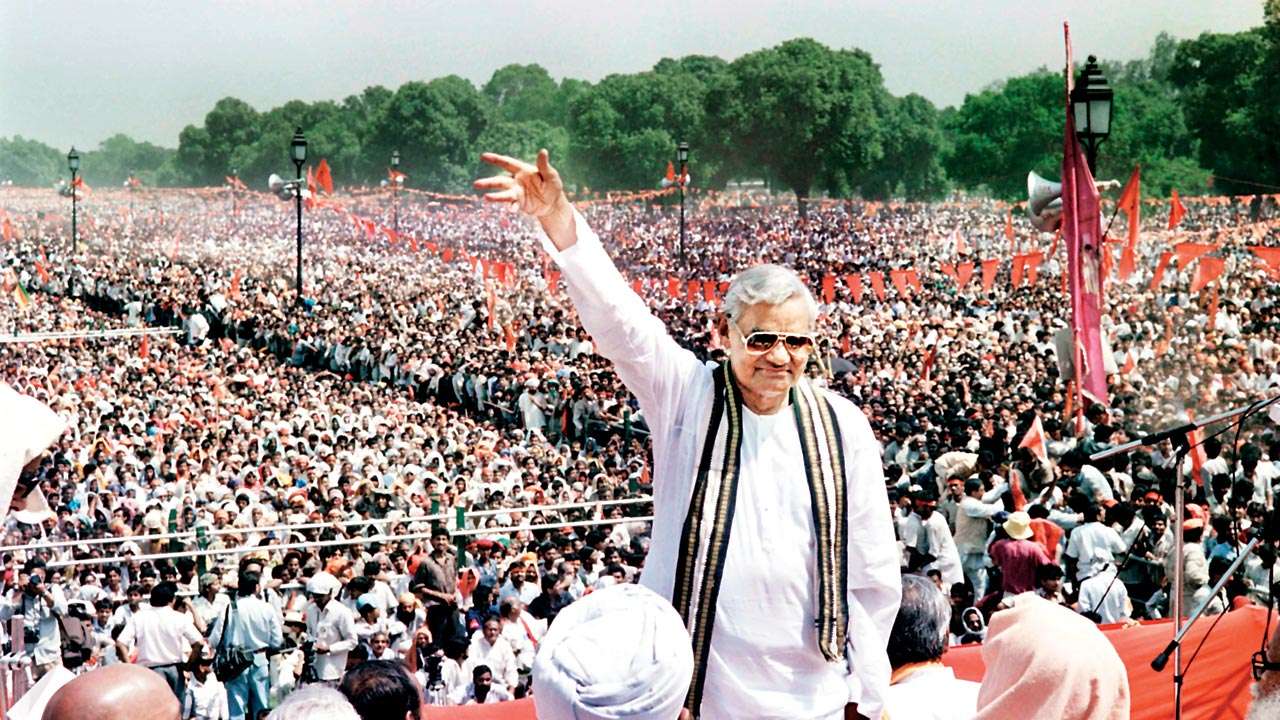
The electronic media had a galaxy of commentators to cover the demise and last rites of India’s first BJP three-time Prime Minister Atal Bihari Vajpayee. But conspicuously missing from that glittering gathering were military officers, considering that the funeral ceremony was conducted almost entirely by them and, more importantly, Vajpayee’s tenure was packed with security-related events on both fronts – China and Pakistan. His poems ‘Haar nahin manunga’ and ‘yudh nahin hone doonga’ demonstrated his steely resolve to deter Rawalpindi and persist in peace-seeking. The message from Pakistan on Vajpayee’s passing away included praise for his faith in SAARC. Vajpayee had immense parliamentary acumen. He learnt to co-habit with the Opposition and built a talented team of independent-minded ministers like George Fernandes, Jaswant Singh, Yashwant Sinha, Arun Shourie and his ideological rival and compatriot, LK Advani.
His first great triumph was the Pokhran nuclear test, which paradoxically led to resetting relations with the US and ruffling Chinese feathers by citing Beijing as the principal reasons for the tests. The Jaswant Singh-Strobe Talbott talks ended with the Next Steps in Strategic Partnership which culminated in the 2005 India-US nuclear deal. This became the open sesame of a defining partnership which Vajpayee described as the one between ‘natural allies’. The Kargil war which followed his Lahore peace yatra in February 1999 was rendered ‘non-escalatory’ before securing vacation of Pakistani intrusions. The Kargil victory enabled BJP in winning the elections. Then in December 1999, like a bolt from the blue came the hijacking of the Indian airliner from Kathmandu to Kandahar which lasted for a week, ending in the exchange of three terrorists for 150 Indian citizens. Succumbing to terrorism haunted the BJP for years.
Despite the hijacking and the betrayal at Lahore, Vajpayee persisted in his efforts for peace with Pakistan. He would say: you can change history, not geography. The Agra summit in July 2001 came a cropper due to its sabotage by both sides. The terrorist attack on Parliament in 2001 led to Operation Parakram – the full mobilisation of Armed Forces and bringing the country to the brink of war not once but twice. First, around January 9, 2002, three days after Vajpayee had attended the Saarc summit in Kathmandu when Gen Musharraf ambushed him by shaking his hand. The second D day was around June 9, after the second terrorist strike at Kaluchak on May 14, 2002, on Army barracks full of soldiers’ families. The US intervened in the crisis extracting pledges from Musharraf on ending terrorism and infiltration while doves and hawks in the Vajpayee cabinet furiously debated the gains and losses of a limited war.
In a briefing in the war room, Army Chief, General S Padmanabhan told Vajpayee: “Sir, I know you won’t let me go to war” (Vajpayee’s yuddh na hone doonga) but I am hoping Musharraf will oblige. Once we go in and you ask me to stop, I will say ‘I can’t hear you’,” he said half-jokingly. The war clouds blew over. India withdrew its forces on October 16, 2002. The exercise in coercion was only partially successful. Jaswant Singh would later say that the Armed Forces were not ready for war. The nuclear overhang was a big factor in preventing conflict. Despite the serial provocations by Pakistan, Vajpayee neither lost his cool nor his resolve to negotiate peace with Pakistan. He did not box India into a corner by stipulating rigid conditions for dialogue like terror and talks will not go together. He followed the Robert Bruce dictum: try, try and you will succeed.
In April 2003, Vajpayee went to Srinagar, extending his hand of friendship to Kashmiris in a public rally. He coined the insightful formula of ‘Insaniyat, Kashmiriyat and Jamhooriyat’ for peace that Modi repeated on Independence Day. And in an electrifying gesture pointing to Islamabad, Vajpayee had said: “I am extending India’s hand of friendship to Pakistan. We will discuss all issues of mutual concern, including Kashmir.” In a political coup of sorts during the Islamabad Saarc summit in January 2004, he extracted a pledge from Musharraf that the Pakistani soil would not be used for terrorism directed against India.
With this ceasefire agreement at LoC in November 2003 and Musharraf’s pledge of stopping cross-border terrorism, India and Pakistan entered the most peaceful phase of their relationship which lasted five years from 2003 to 2007. During this period, the framework of a four-point Kashmir solution was agreed back-channel but could not be consummated for lack of political will in India and because Musharraf lost his job of the Army Chief. It used to be said and it is true today that only a BJP government in India and the military in Pakistan can resolve outstanding disputes including Kashmir.
It is unlikely that the Modi government will follow up on Imran Khan’s ‘you take one step forward and we will take two’ till the elections in 2019. This will allow Khan to work on his ‘new Pakistan’. Modi can at least let Pakistan hold the 2016 postponed Saarc summit in Islamabad later this year in a tribute to Vajpayee’s doctrine: ‘haar nahin manoonga’.
The author is the convenor of the ongoing India-Pakistan Track II dialogue. Views are personal.